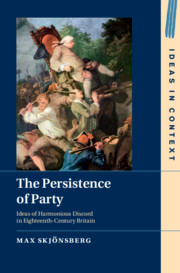Book contents
- The Persistence of Party
- Ideas In Context
- The Persistence of Party
- Copyright page
- Dedication
- Contents
- Figures
- Acknowledgements
- Note on the Text
- Abbreviations
- Introduction
- Chapter 1 Background, Contexts, and Discourses
- Chapter 2 Rapin on the Origins and Nature of Party Division in Britain
- Chapter 3 Bolingbroke’s Country Party Opposition Platform
- Chapter 4 David Hume’s Early Essays on Party Politics
- Chapter 5 Faction Detected? Pulteney, Perceval, and the Tories
- Chapter 6 Hume on the Parties’ Speculative Systems of Thought
- Chapter 7 Hume and the History of Party in England
- Chapter 8 Political Transformations during the Seven Years’ War: Hume and Burke
- Chapter 9 ‘Not Men, But Measures’: John Brown on Free Government without Faction
- Chapter 10 Edmund Burke and the Rockingham Whigs
- Chapter 11 Burke’s Thoughts on the Cause of the Present Discontents
- Chapter 12 Burke and His Party in the Age of Revolution
- Chapter 13 Burke and the Scottish Enlightenment
- Conclusion
- Bibliography
- Index
Introduction
Party in History and Politics
Published online by Cambridge University Press: 27 January 2021
- The Persistence of Party
- Ideas In Context
- The Persistence of Party
- Copyright page
- Dedication
- Contents
- Figures
- Acknowledgements
- Note on the Text
- Abbreviations
- Introduction
- Chapter 1 Background, Contexts, and Discourses
- Chapter 2 Rapin on the Origins and Nature of Party Division in Britain
- Chapter 3 Bolingbroke’s Country Party Opposition Platform
- Chapter 4 David Hume’s Early Essays on Party Politics
- Chapter 5 Faction Detected? Pulteney, Perceval, and the Tories
- Chapter 6 Hume on the Parties’ Speculative Systems of Thought
- Chapter 7 Hume and the History of Party in England
- Chapter 8 Political Transformations during the Seven Years’ War: Hume and Burke
- Chapter 9 ‘Not Men, But Measures’: John Brown on Free Government without Faction
- Chapter 10 Edmund Burke and the Rockingham Whigs
- Chapter 11 Burke’s Thoughts on the Cause of the Present Discontents
- Chapter 12 Burke and His Party in the Age of Revolution
- Chapter 13 Burke and the Scottish Enlightenment
- Conclusion
- Bibliography
- Index
Summary
While there are no timeless arguments in the history of political thought, there may indeed be perennial questions. If anything is recurrent throughout Western thought, it is likely to be the abhorrence of conflict and the quest for stability and peace. Political societies require a degree of internal peace to function. Since they imply division, political parties thus pose a problem for political theory. Extreme partisan divisions threaten to undermine trust among citizens, tear societies apart and constitutions asunder, and degenerate into violent strife and even civil war. Yet parties can also help to pacify and domesticate conflict. Party is an instrument for organising competition and adjudicating between interests and opinions. Any politics worthy of the name entails competition between ‘ins’ and ‘outs’, involving a mixture of interest and principle. Politics is not just about competition, but this is a crucial aspect of any politics that would be recognisable to us in the twenty-first-century Western world, as in many other parts of the world. In modern large-scale societies, effective political action requires numbers and organisation. Moreover, parties and partisanship are natural concomitants of modern understandings of liberty: in 2liberal regimes we have the right to form opinions and associate with others of similar views. Securing political stability has been a concern for political thinkers since at least Thucydides, but the role played by parties in channelling or augmenting division is a more recent concern – one on which this book is focused.
- Type
- Chapter
- Information
- The Persistence of PartyIdeas of Harmonious Discord in Eighteenth-Century Britain, pp. 1 - 11Publisher: Cambridge University PressPrint publication year: 2021

